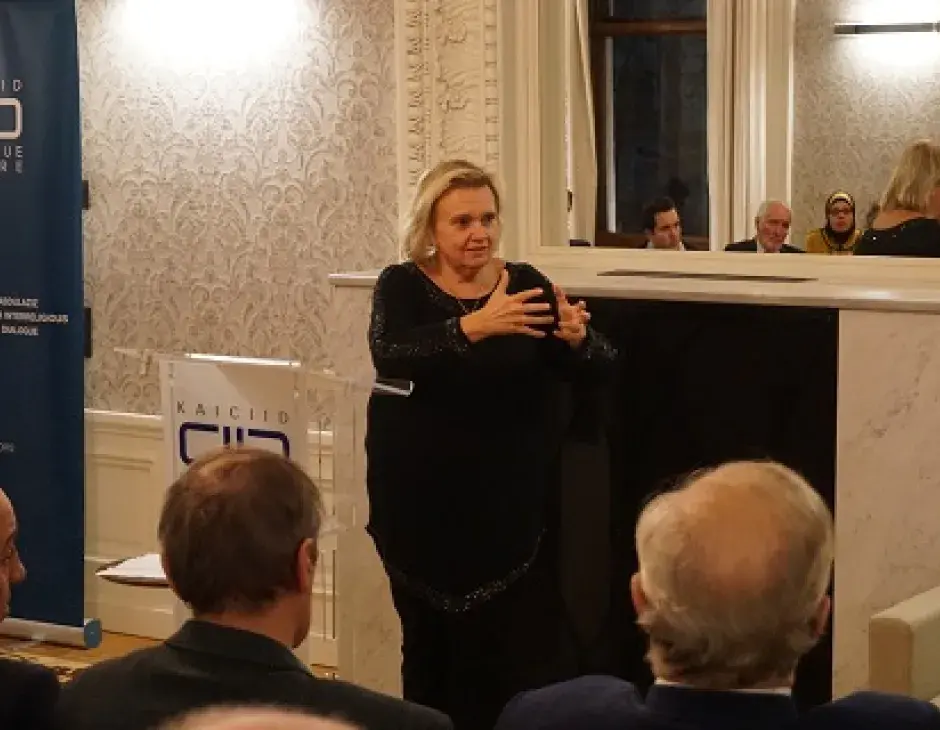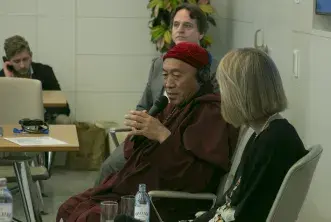How can people of different origins and religions live together in peace? Prof. Dr. Regina Polak of the University of Vienna Catholic Theological Faculty, and recognised expert on religion in the context of migration, devotes her research to answering this pressing question. At the International Dialogue Centre (KAICIID) she shared her insights as part of KAICIID’s open-house lecture series 'Religionen im Dialog' (Religions in Dialogue) in a lecture titled, "Interreligious Dialogue in a Migration Society: a Catholic Perspective".
Prof. Dr. Polak outlined the term “migration society” in a global context and in reference to the situation in Germany and Austria. She described Europe as a transnational society in which citizens come from more than one place they consider home, thus dissolving the classical contrast of homeland versus foreignness long before the onset of the so-called refugee crisis. Nevertheless, the unprecedented increase of asylum seekers tore at the very fabric of Austrian and German society, presenting an immense challenge, as well as an opportunity, for Europe, while at the same time revealing the best and the worst in human nature. On the one hand, we witnessed an impressive united response from civil society, an increase in charitable contributions, and a great ecclesiastical commitment. On the other hand, problems and conflicts dominated media reports, presenting a distorted image of a limited willingness to deepen integration and a rejection of plurality and diversity.
In the context of migration, Prof. Dr. Polak referred to the significance of interreligious dialogue in opening doors to new and enriching possibilities. It is also necessary so that we can learn to recognise and rely on others. She explained that central theological insights were gained in the context of migration experiences such as foreign workers and slaves fleeing the Exile in Egypt, living in Babylonian or Roman diaspora, thus demonstrating how important it is to draw meaning from the current situation as the authors of the Holy Scriptures did in ancient times.
As a Catholic theologian, she explained that since the Second Vatican Council’s declaration on the Church’s relationship with other non-Christian religions (titled, “Nostra Aetate”, or “In Our Time”), interreligious dialogue is not only a means to an end but an end in itself to realise and contribute to the unity of mankind in diversity. Over two decades later in 1991, the Pontifical Council for Interreligious Dialogue identified four levels of dialogue in its reflection “Dialog und Verkündigung”, “Dialogue and Proclamation”: dialogue at the purely human level and in daily life; dialogue as cooperation in social and political issues; dialogue as an exchange between theological experts and religious representatives; and dialogue as theological and spiritual experience. She concluded by once again highlighting the importance of fostering interreligious dialogue in support of greater understanding between people, especially in a migration society.
Religions in Dialogue – Lecture series
KAICIID regularly hosts public lectures in German-language on world religions, interreligious dialogue and coexistence at its historic headquarters in Vienna. The next lecture will take place on 18 January 2018 by Prof. Dr. Paul Zulehner on "Sources of fear and how to overcome it". To register, and to be added to our mailing list, send us an email at dialog(at)kaiciid.org



